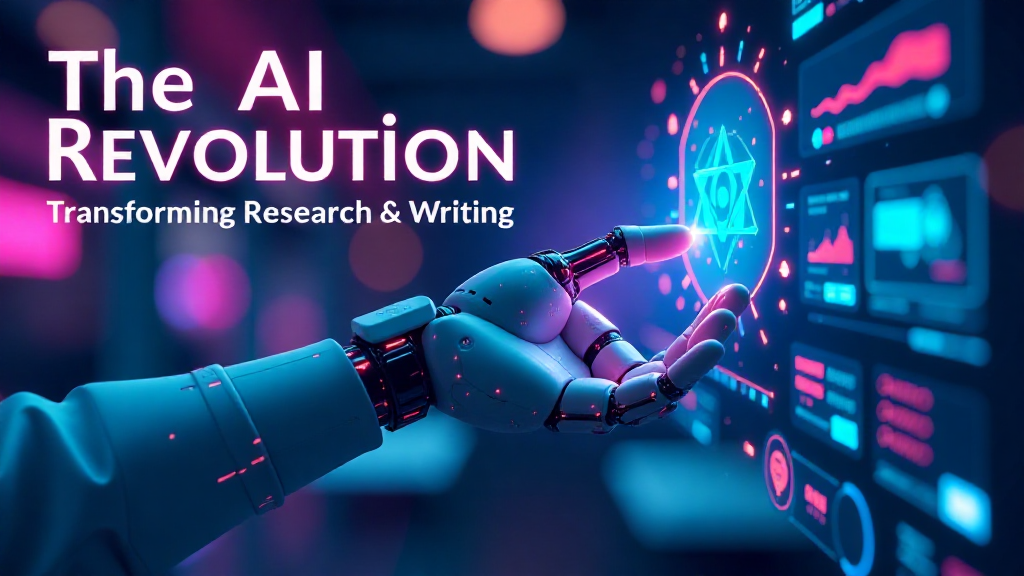Revolution of AI in Research and Writing Redefining Academia
The AI Research Co-pilot: How Artificial Intelligence is Revolutionising Science and Academic Writing
Discover how AI is doing more than writing—it’s designing experiments, analyzing data at superhuman speeds, and uncovering hidden patterns in research. Learn which AI tools are becoming essential co-pilots for scientists and academics in 2025.
Table of Contents
Artificial Intelligence, AI in research and writing, is dramatically reshaping the landscape of academic practices. Its transformative impact is evident in various domains, from automating tedious tasks in laboratories to enhancing the quality of scholarly manuscripts. As we witness this evolution, it becomes clear that AI is not just a tool but a revolutionary force that empowers researchers and writers alike.If you’re more of an audio-visual learner, don’t miss the video we’ve embedded below—it covers the highlights and offers unique insights into this exciting revolution!
The Rise of AI in Research and Writing
AI in research and writing has led to significant breakthroughs and trends that are redefining academic practices. With advancements in deep learning and generative models, AI is being utilized to analyze vast amounts of scientific literature, identify research gaps, and even generate hypotheses. Recent reports indicate that AI can now assist researchers in drafting error-free manuscripts and conducting comprehensive literature reviews, making it an invaluable ally in the academic world.
Moreover, tools like OpenAI’s GPT-4 have opened new avenues for content generation, enabling researchers to draft abstracts, papers, and summaries efficiently. As more than 60% of early-career researchers reported using AI systems in a recent survey, it’s evident that AI is becoming essential in modern research methodologies.
AI Transforming Laboratories
The emergence of AI-powered smart labs marks a significant advancement in laboratory research. These environments leverage automation and robotics to enhance efficiency and accuracy. For instance, companies like DeepMind and BioNTech are developing AI lab assistants capable of automating mundane tasks such as data analysis and experimental design.
Smart labs utilize Internet of Things (IoT) technology to improve data connectivity, allowing instruments to communicate seamlessly. This integration not only streamlines workflows but also enhances reproducibility in scientific experiments. Examples include voice-command systems that enable researchers to operate equipment hands-free while gathering data or managing experiments.
AI in Academic Writing
AI tools are revolutionizing academic writing by assisting researchers in drafting, editing, and optimizing their work. Advanced writing assistants now offer features beyond basic grammar checks; they provide style analysis, tone detection, and even suggestions for clarity and conciseness. Tools like Grammarly and Writefull Academizer are becoming indispensable for academics seeking to enhance their writing quality.
Generative models are particularly noteworthy as they help automate the writing process. By generating human-like text, these models allow researchers to focus on content rather than formatting or structural issues. Additionally, AI can manage citations automatically, reducing the risk of errors and saving valuable time for researchers.

AI Content Detection Tools
AI content detection tools are increasingly being used to identify whether a piece of text is written by humans or generated by artificial intelligence. Popular options include OpenAI’s AI Text Classifier, GPTZero, Originality.AI, Turnitin’s AI detection feature, and Copyleaks. These tools rely on analyzing linguistic patterns, word predictability, perplexity, and burstiness to estimate the likelihood of AI involvement. They are commonly adopted in education, publishing, and digital media to maintain originality, academic integrity, and trust in written communication.
Despite their growing use, these tools face serious limitations that expose a paradox at the heart of their design. AI writing models are continuously trained to produce natural, high-quality, and human-like content, making it difficult for detection methods to keep pace. At the same time, flawless, structured, and professional human writing often gets misclassified as AI-generated, while carefully refined AI outputs may bypass detectors altogether. This contradiction highlights the inherent flaw: tools built with AI to flag AI-created text may end up undermining human work, blurring the line they are supposed to protect.
Future Prospects of AI in Research and Writing
Looking ahead to 2025 and 2030, the potential for AI in research and writing is immense. Experts predict that AI will continue to evolve as a transformative general-purpose technology across all scientific disciplines. Its capabilities will expand to include more sophisticated data analysis techniques and enhanced collaboration tools that bridge gaps between different fields.
As AI becomes more integrated into research practices, training the next generation of scientists to work effectively with these technologies will be crucial for fostering innovation and ensuring ethical use.
Watch the Video
Want a deeper dive into how you can get the benefits of AI in research and writing? Watch this video for a comprehensive exploration of these groundbreaking advancements! https://youtu.be/XlxKmSbHpKE
Conclusion
In summary, AI in research and writing is not just altering how research is conducted; it is fundamentally transforming the entire landscape of academic writing. From smart labs equipped with robotic assistants to advanced writing tools that enhance productivity, the future looks promising for researchers harnessing the power of AI.
What excites you most about the role of AI in research and writing? Share your thoughts in the comments below. And don’t forget to check out our YouTube channel for more insightful videos!
💡 Frequently Asked Questions: AI in Research & Writing
How to use AI in research and writing today?
Modern AI assists across the entire research lifecycle: from literature review and hypothesis generation to data analysis, visualisation, and drafting manuscripts. It acts as a co-pilot, handling repetitive tasks and uncovering insights humans might miss.
Can AI actually help formulate a research question?
Yes. By analysing vast bodies of existing literature, AI can identify gaps, contradictions, and emerging trends, helping researchers formulate novel, impactful, and feasible research questions.
What are the ethical concerns of using AI for academic writing?
Key concerns include plagiarism, authorship integrity, and over-reliance. The ethical use of AI requires full transparency about its role, human oversight of all content, and using it as a tool for enhancement—not replacement.
Which AI tools are best for data analysis in research?
Beyond general LLMs, specialised tools are emerging for statistical analysis (like AI-powered R/R/Python assistants), qualitative data coding, and generating complex data visualisations from simple text prompts.
Will AI replace researchers and academics?
No. AI is a powerful tool that augments human intelligence. It handles data-heavy lifting and administrative tasks, freeing up researchers to focus on critical thinking, creativity, experimental design, and deep interpretation—the uniquely human elements of research. AI in research and writing is a way forward for a better future, and it should be taken in this way only.
How can I use AI to improve my academic writing without being detected as AI?
Use AI for brainstorming, structuring arguments, and checking clarity—not for generating final text. The goal is to enhance your unique voice, not mimic a generic AI tone. Always heavily edit, add your specific insights, and ensure the final work is unmistakably your own.






2 Comments